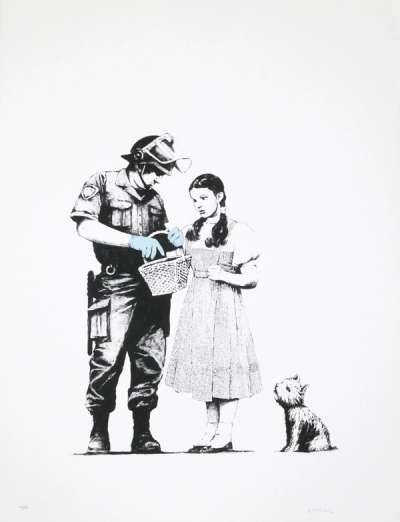Stop
And Search
In Banksy's Stop And Search, a modern-day policeman, wearing forensic gloves, stops and searches Dorothy from the Wizard of Oz, putting a sarcastic spin on Dorothy's famous line: "There's no place like home." Banksy targets the UK government's stop-and-search policy because it is known to disproportionately target ethnic minorities.
Banksy Stop And Search For sale
Stop And Search Value (5 Years)
Works from the Stop And Search series by Banksy have a strong market value presence, with 58 auction appearances. Top performing works have achieved standout auction results, with peak hammer prices of £90000. Over the past 12 months, average values across the series have ranged from £18000 to £25000. The series shows an average annual growth rate of 10.35%.
Stop And Search Market value
Auction Results
| Artwork | Auction Date | Auction House | Return to Seller | Hammer Price | Buyer Paid |
|---|---|---|---|---|---|
 Stop And Search Banksy Signed Print | 24 Jan 2026 | Phillips London | £13,600 | £16,000 | £23,000 |
Sell Your Art
with Us
with Us
Join Our Network of Collectors. Buy, Sell and Track Demand
Meaning & Analysis
Featuring the Wizard of Oz’s Dorothy and Toto, Banksy’s Stop and Search shows the Kansan having her wicker basket searched by a gloved policeman. A satirical take on the controversial 'stop and search' legislation, first introduced by the UK government in the '80s, Stop and Search references a much-criticised UK government policy that has since become a byword for the disproportionate targeting of ethnic minorities by police forces.
Printed mostly in black and white - except for the blue of the policeman’s disposable gloves - the print shows Dorothy in her now iconic gingham dress, her face betraying a sense of concern at her treatment. Played by Judy Garland in the 1939 film, Dorothy is a typical of the 'harmless female' archetype, peddled by the Hollywood-based US film industry throughout the 20th century. Portrayed as harmless and naive, and with the catchphrase ”there’s no place like home”, Dorothy serves as a figuration of childhood innocence.
This symbolic role is only reinforced by the presence of Dorothy's little terrier, Toto, who represents the celebrated values of loyalty and companionship. With its symbolic qualities in mind, then, this Banksy print subverts traditional iconic associations, introducting an armed officer clad in riot gear so as to disrupt visual meaning and balance.








